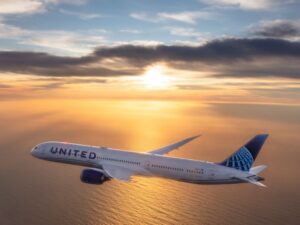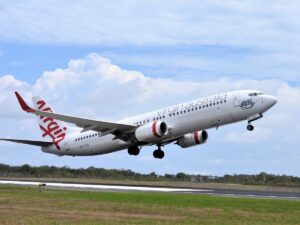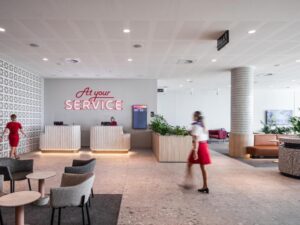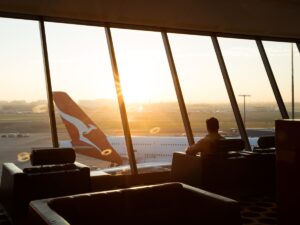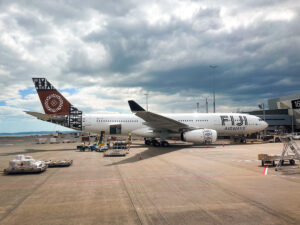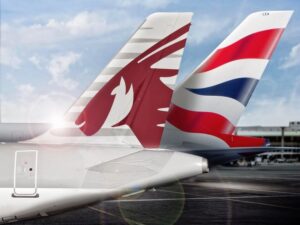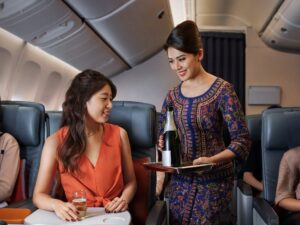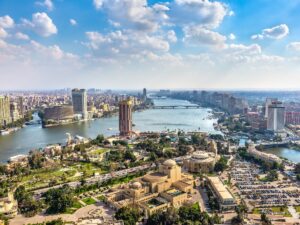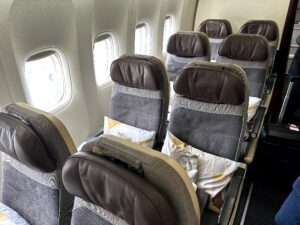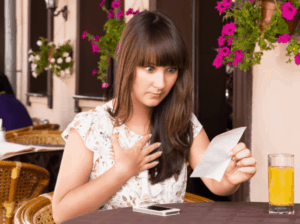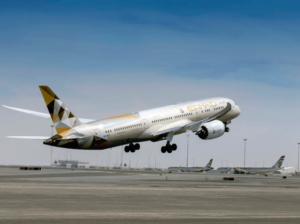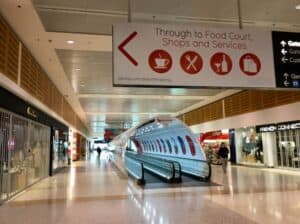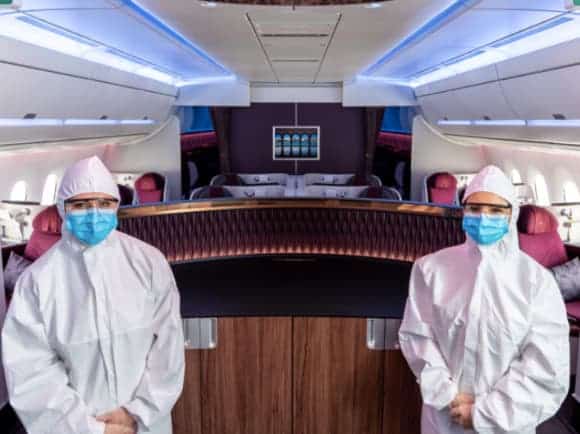
This week, Qantas revealed how it plans to woo travellers back to the skies with face masks and hand sanitiser. But, while social distancing will be practiced at airports, Qantas won’t commit to blocking middle seats on its flights.
Qantas is not alone, with many airlines protesting that leaving seats empty would drastically increase airfares and make their businesses unviable. Meanwhile, some airlines are issuing flight attendants with new uniforms comprised of Personal Protective Equipment, and some countries are offering COVID-19 tests to arriving passengers.
The race for a vaccine is on. In the meantime, life must go on. Some people still need to travel, and airlines & airports all over the world are adapting to the “new normal”. So, what exactly will air travel be like in the foreseeable future, before a COVID-19 vaccine is developed?
Domestic travel within Australia without a COVID-19 vaccine
As part of its new “Fly Well” initiative, Qantas and its subsidiary Jetstar will install hand sanitising stations at boarding gates and provide face masks to all passengers on board flights. But Qantas and Jetstar will not make it mandatory for passengers to wear face masks. The program will roll out from 12 June 2020.
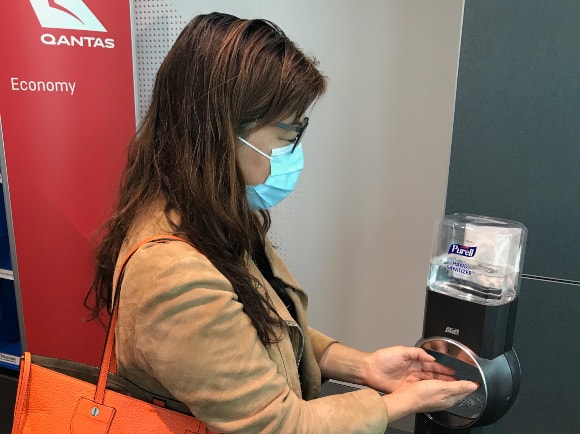
Qantas will also make changes to its airport lounges – whenever they are allowed to re-open – which will include “increased physical distancing, hand sanitising stations, enhanced disinfection of surfaces and adjustments to food and drink service”.
Customers will also be encouraged to check in online, use Q Bag tags (instead of paper bag tags) and minimise movement around the cabin once on board the plane. A “simplified” catering service will continue in order to “minimise touchpoints for crew and passengers”. (Of course, this also has the benefit of reducing costs.)
Qantas says that it will implement a “sequenced boarding and disembarkation” to avoid crowding… although, based on Qantas’ appalling record when it comes to priority boarding, it remains to be seen whether this will be successful. Like most airlines, Qantas also says it will clean its planes more thoroughly than usual between flights.
Virgin Australia says it has masks and hand sanitiser available on all flights. Virgin is also blocking middle seat selection during check-in, however families travelling in a group can still be seated together (including in a middle seat).
Meanwhile, Regional Express (Rex) will make face masks compulsory for all passengers from 1 June 2020. Rex passengers will be required to bring their own mask or buy one at check-in. Anyone that refuses to wear a mask will be denied boarding, except in exceptional circumstances.
International travel without a COVID-19 vaccine
Many overseas airlines including Singapore Airlines, Emirates, Lufthansa & Air France have now made face masks mandatory for all passengers.
In general, we can expect less human contact points throughout the journey as airports race to install more automated check-in machines & passport control gates, and install protective screens at staffed airport counters.
While limited domestic travel is currently possible, Australia’s borders currently remain closed for anything other than essential travel or repatriation. Australians still require approval to leave the country, and the Australian government is only letting Australian citizens, permanent residents, their immediate family members and operating flight crews into the country – after two weeks of hotel quarantine, of course.
The Australian government has signalled that “normal” international travel is not likely to resume until next year. However, there may be exceptions for travel to New Zealand and some Pacific Island nations.
Australia is not the only country considering opening its border to a select few countries. Several European countries have already introduced so-called “travel bubbles” where cross-border travel is permitted only within “safe” countries that are participating in the bubble. This trend could well continue until a vaccine or effective treatment for COVID-19 is found.
Ideas of “green & red zones”, as well as “immunity passes” enabling unrestricted travel those who have previously contracted COVID-19 and recovered, are also being floated around.
While countries such as Australia and New Zealand have closed their borders, other countries have taken different approaches. In Austria, for example, international travellers are required to isolate after arrival for 14 days. But Austrian residents can avoid this by paying €190 (~$318) to undergo a coronavirus test upon arrival at Vienna International Airport. If the test result is negative, they are free to enter the country without being subject to the quarantine requirement.
Iceland has taken a similar approach. When it reopens to tourists in June, it will allow visitors to avoid a mandatory two-week quarantine period by taking a COVID-19 test on arrival. The result will be available within a few hours, and if negative, the isolation requirement will be waived. Initially, Iceland’s government will even pay for the tests. As an additional measure in Iceland, inbound tourists will be required to download a tracing App similar to the Australian government’s COVIDSafe App.
Some other countries are requiring inbound travellers to produce a recent medical certificate proving good health and/or a negative COVID-19 test result. To cater for this, Emirates had been trialling a COVID-19 testing service for travellers departing from Dubai to countries such as Tunisia and India. Emirates got a lot of free publicity out of the trial, which was said to provide test results within 10 minutes. There was just one problem… the test results were only accurate 30% of the time. Emirates has since withdrawn this service and reverted to temperature testing.
Social distancing on board: To block or not to block the middle seat?
There have been a lot of debates about whether social distancing should be enforced on flights. With Australians being encouraged to stay at least 1.5 metres away from other people everywhere else, some question why planes should be exempt.
Airlines argue that it won’t be economically viable to operate most flights if they are forced to block middle seats. On a Boeing 737 or Airbus A320 flight, for example, blocking middle seats results in 33% fewer Economy seats being available. On A330 flights, social distancing measures result in half of all available Economy seats being blocked.
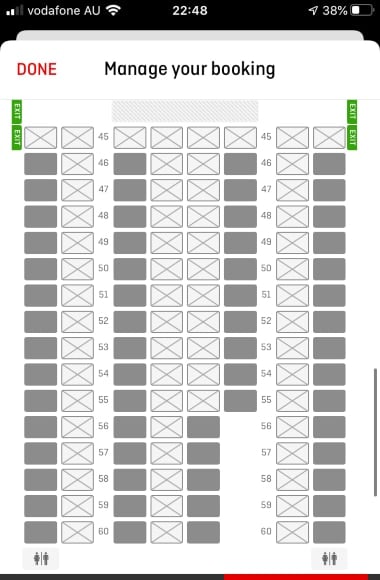
In the short term, social distancing may not be such an issue because demand for air travel during the COVID-19 pandemic is low anyway. But blocking middle seats is not sustainable for airlines, who operate on very tight margins even under normal circumstances. For an airline to break even on a Sydney-Melbourne flight, for example, airfares would need to increase by 52% if all middle seats are blocked.
Despite this, airlines such as Delta in the United States have introduced middle-seat blocking as policy… at least for now. Low-cost carrier Frontier, meanwhile, tried offering passengers the option to buy the middle seat for a small additional fee.
Back in Australia, Qantas, Jetstar, Virgin & Rex have all been applying social distancing principles to seat selection on their flights until now. But don’t expect this to continue.
Join the discussion on the Australian Frequent Flyer forum: How will international travel work with no COVID 19 vaccine
